Photographs: Mohammad Ishaq/Reuters
Abdullah Abdullah is late for his appointment because he's in conversation with scores of Afghans, presumably on how to win the presidential election that he's contesting next month. A tent has been set up behind the house that has been rented for the campaign in Shahr-e Nau, in the heart of Kabul, just for confabulations. Several men are milling around the place, just like partymen and women do on the eve of elections elsewhere in the world. Except in this case, the supporters are restricted to one gender -- they are all men.
Moreover, the place is so quiet, except for the murmuring that rises between the tall, strapping Afghans in shalwar-kameez and flowing turbans, you would think you are going to a wake instead of to an interview.
Text: Jyoti Malhotra in Kabul
'Karzai turned a golden opportunity into an abyss'
Image: An armoured vehicle of the US army drives past an election sign in the valley of Kunar River in Afghanistan's Kunar province.Photographs: Tim Wimborne/Reuters
Abdullah is late, but an aide with an American accent fills up the gaps: Yes, Dr Abdullah is an ophthalmologist, but he hasn't practised for several years now. He was the new country's first foreign minister after the Taliban were ousted in November 2001, but after he fell out with President Hamid Karzai in 2006, he has been fully occupied with the Ahmed Shah Masood foundation, set up in honour of the Afghan hero who was murdered by the Al Qaeda (two men masquerading as journalists had gone to interview Masood three days before 9/11 and the bomb hidden in their TV camera went off). And yes, he spends a lot of time in Delhi.
"Karzai has lost the people. For the first time, the people are not following their leaders in Afghanistan. They don't have any hope left in the current system. Karzai has turned a golden opportunity into an abyss," Abdullah says, within minutes of walking into the room and starting the interview.
Times are slowly a-changing
Image: A man waits under posters of presidential candidates in Afghanistan's upcoming election in Kabul.Photographs: Ahmad Masood/Reuters
Abdullah's criticism of his opponent Karzai is refreshingly par for the democratic course. In a country where large parts are still ruled by the Taliban and out of bounds for even the central authorities, where the long-flowing shuttlecock burqa or chador (covers the body but frees the eyes behind a net) is common and the veil is ubiquitous, and where warlordism is rampant, the fact that 44 people have decided to stand in the presidential election on August 20 and challenge the incumbent, Hamid Karzai, means the times are slowly a-changing in Afghanistan.
Significantly, Karzai's popularity is low, but his victory is more or less a foregone conclusion. Abdullah knows it, which is why he says, "Without a big fraud, Karzai won't win. Only with a fairly free and a fairly fair election, can things change," he adds.
The third major candidate and former finance minister under Karzai, Ashraf Ghani is rumoured to be a US citizen. It's clear, his renunciation of that green card is not going to win him many votes in the old country.
Why Karzai is unpopular
Image: An Afghan soldier conducts a body search of a villager, before receiving his registration card for the upcoming presidential election, in Babaji village in Helmand province.Photographs: Omar Sobhani/Reuters
Until a year or so ago, Karzai was widely seen as a puppet of the Bush administration and, therefore, only marginally effective. In the early Obama months, he was at the receiving end of the former's ire -- although that has eased off lately. Considering how wildly popular the Americans were after they threw out the Taliban soon after 9/11, the swinging pendulum in Afghanistan is an indication of how much the Afghans want the Americans out of their country.
Karzai's unpopularity stems from the fact that the Taliban are back in large parts of the south, extortions and kidnappings have gone up in big cities like Kabul (at least two-three a day), corruption is rampant, that one of his brothers is involved in the narco trade in Kandahar and the President has done nothing about it, that he's been unable or unwilling to control the growing independence of the warlords who treat their provinces as their own little fiefs, and that the US-led international forces (4,000 American troops moved into the Helmand valley last week) are the real power in Afghanistan.
Karzai wants American forces to leave
Image: Afghan President Hamid Karzai, who is also one of the presidential candidates, at an electoral rally in Kabul.Photographs: Ahmad Masood/Reuters
In a bid to assert himself, in November 2008, Karzai offered protection to Mullah Omar, the Taliban chief, seeking to differentiate the home-grown Taliban (who are largely Pashtuns) from the Arab-Al Qaeda. So, when he told a UN Security Council delegation, also in November, that the foreign forces must set a timetable to end the war against the Taliban, it was clear he was signalling to the Americans that their welcome was limited.
Meanwhile, Karzai, a Pashtun belonging to the Popalzai branch of the Durrani tribe, was firming up his candidacy by taking as his running vice-presidential mates Marshal Qasim Fahim, a Tajik, and Karim Khalili, a Hazara, hoping he would get the support of these two large ethnic groups. It didn't matter that Fahim, although a legendary mujahideen fighter against the Soviets, has a well-worn reputation for cruelty (after the ouster of the Taliban from Kunduz, Fahim is believed to have ordered imprisonment inside containers of scores of Taliban fighters, who were left to die).
'If you lose the people, you lose the war'
Image: Women attend an election campaign for Afghan presidential candidate Ashraf Ghani Ahmadzai in Kabul.Photographs: Shamil Zhumatov/Reuters
As for Abdullah, he has strong words for Karzai's inability to control the growth of the Taliban. "I don't believe that most Afghans have joined the Taliban out of ideological or religious conviction. Many are there because of their frustration with the failure of the government. We must talk to these people, otherwise we're losing them. And, in an insurgency, if you lose the people, you lose the war," he says.
But the former foreign minister is unwilling to put all the blame for the resurgence of the Taliban on Pakistan. "The fundamental decision that terrorism will hurt you if you use it as an instrument of state policy, I wonder if Pakistan has made that decision. But after the Pakistan army's operations in Swat, I think it has become serious about combating terrorism. I wish it had done so earlier, so as to enable the rise of a new situation. We should not underestimate the gravity of the situation in the border area between Pakistan and Afghanistan," Abdullah adds.
Switzerland in Middle Asia
Image: A man covers his face during a sandstorm while he walks past election posters of Mirwais Yasini, a presidential candidate, in Kabul.Photographs: Shamil Zhumatov/Reuters
Then, as he buttons his jacket and rises to meet his Pashtun supporters in the tent, Abdullah points out that he has been thinking, more and more, about the "idea of neutrality for the Afghan state," a kind of Switzerland in Middle Asia.
It is an idea that has found favour both with Hamid Karzai and Henry Kissinger. Clearly, Abdullah is referring to the games great powers continue to play in Afghanistan, both for its own rich resources and the fact that it is a bridge to the energy-rich Central Asian region.
For the moment, though, his musings must be put aside so as to deal with the poppy-induced nightmares that are an alibi for the Taliban terrorists. This is Afghanistan's reality and the presidential elections next month are going to be a major milestone.

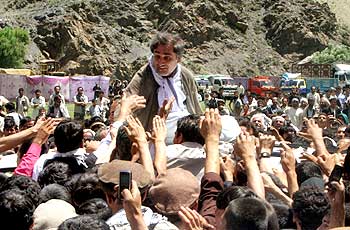
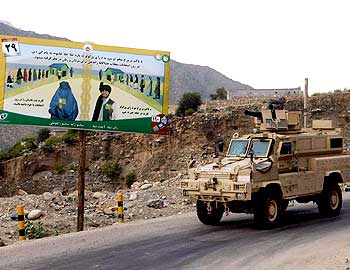
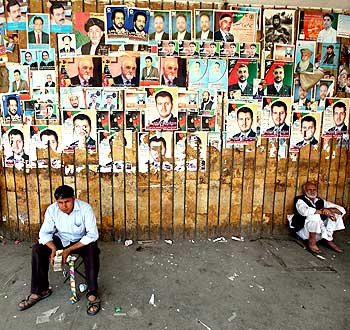
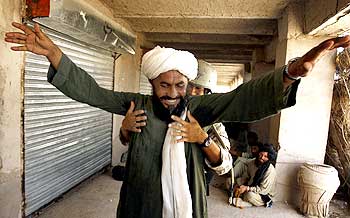
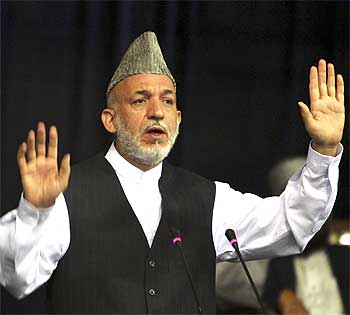
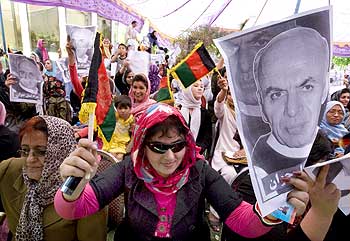
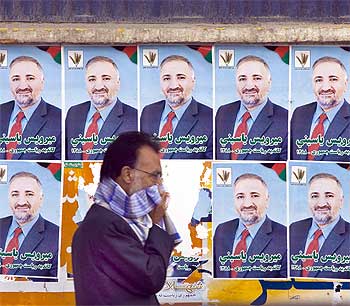
article